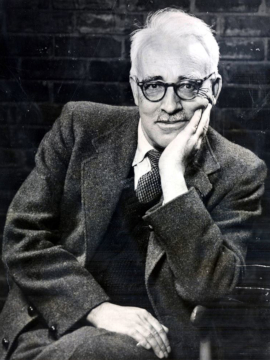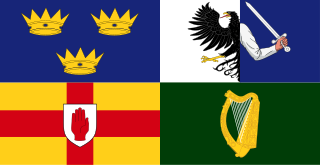
Niamh is the lover or spouse of Oisín, son of Fionn mac Cumhail, in the Fianna Cycle of Irish mythology.

Irish literature is literature written in the Irish, Latin, English and Scots languages on the island of Ireland. The earliest recorded Irish writing dates from back in the 7th century and was produced by monks writing in both Latin and Early Irish, including religious texts, poetry and mythological tales. There is a large surviving body of Irish mythological writing, including tales such as The Táin and Mad King Sweeny.
Although Irish has been used as a literary language for more than 1,500 years, and modern literature in Irish dates – as in most European languages – to the 16th century, modern Irish literature owes much of its popularity to the 19th century Gaelic Revival, a cultural and language revival movement, and to the efforts of more recent poets and writers. In an act of literary decolonization common to many other peoples seeking self-determination, writers in Irish have taken the advice of Patrick Pearse and have combined influences from both their own literary history and the whole of world literature. Writers in Modern Irish have accordingly produced some of the most interesting literature to come out of Ireland, while being both supplemented and influenced by poetry and prose composed in the Irish language outside Ireland.

Frank O'Connor was an Irish author and translator. He wrote poetry, dramatic works, memoirs, journalistic columns and features on aspects of Irish culture and history, criticism, long and short fiction, biography, and travel books. He is most widely known for his more than 150 short stories and for his memoirs. The Frank O'Connor International Short Story Award was named in his honour.

Oisín, Osian, Ossian, or anglicized as Osheen was regarded in legend as the greatest poet of Ireland, a warrior of the Fianna in the Ossianic or Fenian Cycle of Irish mythology. He is the demigod son of Fionn mac Cumhaill and of Sadhbh, and is the narrator of much of the cycle and composition of the poems are attributed to him.

Máirtín Ó Cadhain was one of the most prominent Irish language writers of the twentieth century. Perhaps best known for his 1949 novel Cré na Cille, Ó Cadhain played a key role in reintroducing literary modernism into modern literature in Irish, where it had been dormant since the 1916 execution of Patrick Pearse. Politically, Ó Cadhain was an Irish republican and anti-clerical Marxist, who promoted the Athghabháil na hÉireann, . Ó Cadhain was also a member of the post-Civil War Irish Republican Army and was interned by the Irish Army in the Curragh Camp with Brendan Behan and many other IRA members during the Emergency.
In Irish mythology, Tír na nÓg or Tír na hÓige is one of the names for the Celtic Otherworld, or perhaps for a part of it. Tír na nÓg is best known from the tale of Oisín and Niamh.

Tír na nÓg are an Irish folk duo formed in Dublin, Ireland, in 1969 by Leo O'Kelly and Sonny Condell. They are often considered one of the first progressive folk bands with other artists like Nick Drake or groups like Pentangle. Their music mainly consists of their own compositions, based on strong Celtic roots and typically featuring intricate acoustic guitar playing and close harmony singing. In their early years, they toured the folk clubs of the United Kingdom or internationally as a support act for several rock bands. Today, they sporadically give concerts, especially in Ireland.

Kevin John William Crossley-Holland is an English translator, children's author and poet. His best known work is probably the Arthur trilogy (2000–2003), for which he won the Guardian Children's Fiction Prize and other recognition.

Gabriel Rosenstock is an Irish writer who works chiefly in the Irish language. A member of Aosdána, he is poet, playwright, haikuist, tankaist, essayist, and author/translator of over 180 books, mostly in Irish. Born in Kilfinane, County Limerick, he currently resides in Dublin.
The Tir na n-Og Awards are a set of annual children's literary awards in Wales from 1976. They are presented by the Books Council of Wales to the best books published during the preceding calendar year in each of three awards categories, one English-language and two Welsh-language. Their purpose is "[to raise] the standard of children's and young people's books and to encourage the buying and reading of good books." There is no restriction to fiction or prose. Each prize is £1,000.

Father Peadar Ua Laoghaire or Peadar Ó Laoghaire, also anglicized as Peter O'Leary, was an Irish writer and Catholic priest, who is regarded today as one of the founders of modern literature in Irish.
Events from the year 1334 in Ireland.
Gomer Press is a family printing company based in Llandysul, west Wales. It was the largest publishing house in Wales.
The Irish short story has a distinctive place in the modern Irish literary tradition. Many of Ireland's best writers, both in English and Irish, have been practitioners of the genre.
The Irish language originated in Ireland and has historically been the dominant language of the Irish people. They took it with them to a number of other countries, and in Scotland and the Isle of Man it gave rise to Scottish Gaelic and Manx, respectively.

Collected Stories is a collection of 67 of Frank O'Connor's best-known short stories, first published in 1981.

Eithne, also known as Éan an Cheoil Bhinn, is considered by many critics to be the first full-scale opera written and performed in the Irish language. It was written by English/Irish composer Robert O'Dwyer.
Al Liamm is a bimonthly magazine of culture and literature in the Breton language.

An Irish comic is a periodical published in Ireland that contains comic strips. Ireland's comic book market has historically been very small, and closely linked to the British market. In recent years, many comics have been released with themes drawn from Irish mythology and history. The Irish comic industry has its roots in Irish nationalism and Irish Catholicism. Most comics are in English, but some in the Irish language have also been produced. Authors have often portrayed Cú Chulainn and the like as superheroes, and made explicit connection between them and Irish revolutionaries.












